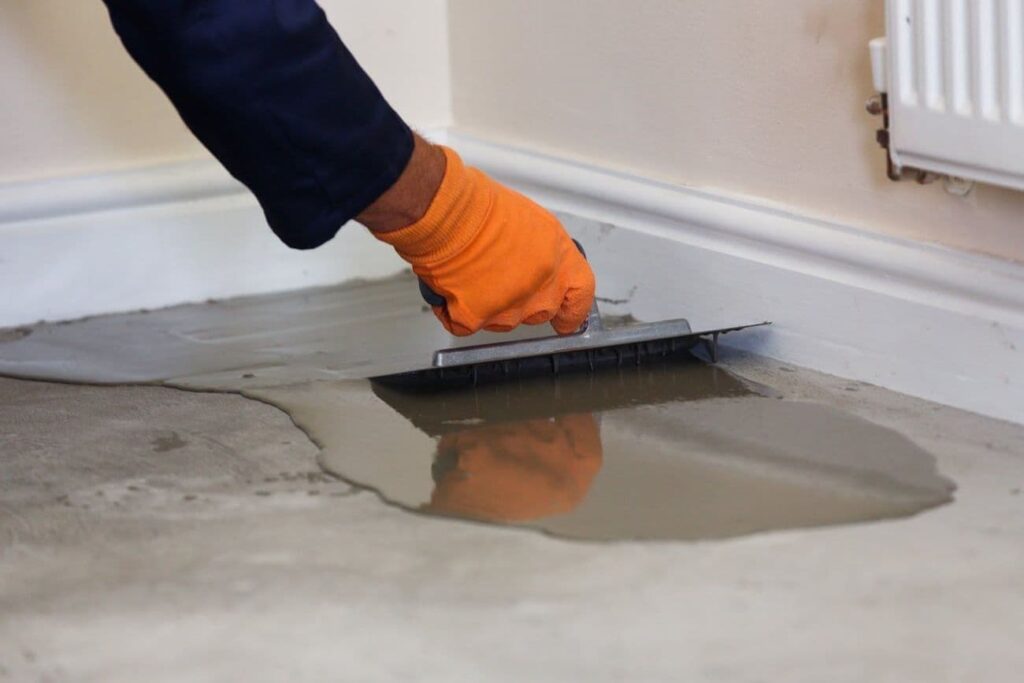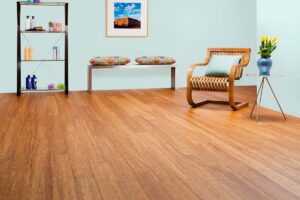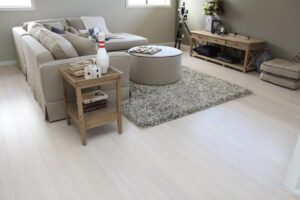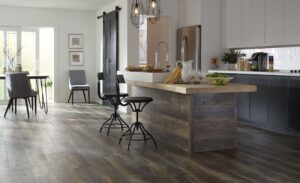So you are about to renovate your floors yet you are too worried about the case of underlying floor and the cost to level it out, this is the time you must check the best self-leveling concrete we are going to discuss.
If you are new to flooring, let’s define what actually self-leveling concrete. Simply to understand, self-leveling concrete is a polymer-modified concrete which is highly sticky.
As a thick liquid, it is poured over the floor and let it runs to the corners and across the floors, creating a flat surface. Notice, you need only a little effort to make it.
Self-leveling concrete is considered ideal for flatten existing floors such as tile, plywood and concrete. It is good to make before you are installing new interior floors like LVP tiles or wood in the home.
However, though best self-leveling concrete is relatively easy to install than the traditional stuff, the things can always go wrong unexpectedly.
In this case, mixing can be very challenging, the window to pour is too short and the environment has different options so that you cannot get it right. Well, there are lots of things that can mistakenly occur with this Home DIY project.
To acknowledge you with the complete understanding, our article comes with several sections discussing the advantages and disadvantages of self-leveling concrete, different types of self-leveling concrete, 5 best self-leveling concrete, how to install the self-leveling concrete, product precautions and some frequently asked questions as well as the conclusion.
Now let’s have a quick read on each of the sections’ detailed explanation below:
Advantages Of Self-Leveling Concrete
Self-leveling concrete is much more advantageous than the traditional concrete. In fact, installing self-leveling concrete allows you to save more of your money.
Further, many of professional builder will use this type of concrete to complete the flooring project even without your request.
The advantages of using self-leveling concrete include:
- No water you need to build self-leveling concrete. This lead to have less mess and fuss.
- Self-leveling concrete creates a highly strong and smooth surface to make an ideal underlay for new flooring you are about to install. The floor will also be strong enough though it may stand alone.
- Self-leveling concrete can be used not only for leveling concrete but also for the top of any non-flexible surface like plywood, LVP, wood and tile.
- It is easy to create self-leveling concrete. Even the amateur can do the project well.
- Self-leveling concrete is stronger than the normal concrete, making it ideal for reinforced construction of the concrete.
- There will be no allergic reactions due to the installation of self-leveling concrete.
- Self-leveling concrete is more resistant the growth of mold especially in the wet areas compared to the regular concrete.
- Self-leveling concrete dries very quickly, meaning that it takes only a little time so that you can go for the next step of flooring project.
Read Also: IVC Vinyl Flooring Reviews
Disadvantages Of Self-Leveling Concrete
Believe it or not, even the best self-leveling concrete comes with a number of disadvantages. This is because a product must have some drawbacks that everyone should be aware when working with it.
Here are the 3 biggest drawbacks of having self-leveling concrete in your home:
- Due to the quick dry of self-leveling concrete, you must do the project very quickly, too. In general, 20 minutes is recommended to mix, pour and finish the surface though all the things are depending on the product and the environment conditions.
- Self-leveling concrete is not related with reinforcing the under-layer on which it is laid. If there is something wrong with the subfloor, the self-leveling concrete will loosen. This can cause a damage to anything that is laid on it.
- Due to the fact that self-leveling concrete can be very sticky to the tools splashed against it. Thus, clean the floor away from any items to ensure that they would not permanently stained.
Different Types Of Best Self-Leveling Concrete
Self-leveling concrete comes with the two different types. Those are acrylic-based and water-based self-leveling concrete. Consider the explanation of each types below:
Acrylic-Based Self-Leveling Compound
The first type of self-leveling concrete is the acrylic-based compound. Basically, it is made from mixing acrylic liquid polymer and cement powder.
The result of this mixing is relatively elastic concrete floor which is resistant to abrasions and scratches.
Acrylic-based self-leveling compound takes longer to dry than the other self-leveling type of concrete.
Water-Based Self-Leveling Compound
The second type you can try to make self-leveling concrete is the water-based compound. As the name suggests, water-based self-leveling compound uses water as the lubricant. As a result, the surface of the concrete floor is more consistent in line with the normal concrete.
Water-based self-leveling concrete dries quickly around 20 minutes. This way, you can buy in powder form and mix it with the water to create the water-based self-leveling concrete.
5 Best Self-Leveling Concrete
In fact, there are a huge number of self-leveling concrete available in most of home improvement stores. To narrow your choices, here are the 5 best self-leveling concrete to look closely as the best brands.
Akona: The Best Overall Floor leveling Compound
Akona is the water-based product of self-leveling that everyone can mix by himself. Using Akona only requires you to add water as primer has already been added to the mix. Akona is created only for interior application and laid to a 1/8 thickness.
Akona dries quickly. Thus, it is suitable for flooring project with radiant heating installations. Further, it can provide protection to cables and tubes. Akona can be expected to finish in 10 to 20 minutes to lay.
Sikafloor: The Best Acrylic Concrete Floor Leveler
Sikafloor is the second best self-leveling concrete which is the best acrylic-based compound. It offers both the standard and latex variations for an extra flexible surface.
Sikafloor can be laid thinner than the other types of self-leveling concrete. This way, you can spread as thin as 1/25 inch or as thick as 1 ½ inch.
Sikafloor is an acrylic option allowing you to possibly walk on the floor after around four hours.
Henry: The Bes Leveler for Thickness
For the best leveler for thickness, you can consider Henry. This is the type of self-leveling concrete which is water-based compound. It comes in powder form so you need only to mix it with water, pour and spread it.
Henry is featuring fast-drying, allowing you to start laying the ceramic tile just 6 hours after the installation. For other flooring, you will need approximately 16 hours.
Henry is considered ideal to deal with a deeper crevices on your floor. This type can be laid up to 5 inches thick over the concrete, wood and ceramic tile. Unlike Akona, Henry comes without primer. The primer layer should be given before pouring.
LevelQuick: The Best Leveler For Final Surface
LevelQuick is another water-based compound which is the best leveler for final surface. It is available in powder form. So you need only to mix it with the water and create the self-leveling concrete.
This type is designed for one pour only. You can lay it up to 1 ½ inches of thickness. Noticeably, this type is suitable for not only home use but also commercial use in locations like breweries, kitchens and food plants.
Mapei: The Best Value for Money Leveler
The last but not least type of self-leveling concrete is Mapei. It is a water-based compound which is highly affordable. This way, you need only $30 for a 50-pound bag powder.
Mapei is designed for indoor floors especially for ceramic tiles. This way, you can expect to have 10 to 15 minutes of initial set.
How To Install Self-Leveling Concrete
As we have mentioned, self-leveling concrete is easy to install. You can pour it yourself without a professional eye to get the perfect flat floor.
However, just because it is easy to install doesn’t mean that it is cannot be complicated. Notice, preparation is the most crucial step.
- Prepare your surface by cleaning any debris and makes sure the floors are free from any items on it.
- Free the surface from any moisture.
- Vacuum the floor thoroughly.
- Include a primer. Don’t forget to consult with the product instructions to see the right primer for your floors.
- Mix the cement in a large bucket with the water and gradually introduce the powder.
- Mix them until the mixture is thick. Keep mixing until you are ready to pour it.
- Pour the mixture on the prepared floor quickly.
- Use a trowel to push the mixture into uncovered areas.
- Clean up any drips and splashes.
- Wait for the initial set between 10 minutes and 2 hours depending on the product conditions.
Best Self-Leveling Concrete Product Precautions
Once you know the best self-leveling concrete to choose, don’t forget to check out the product precautions either. In this case, there are some limitations that you must consider about the products:
- Avoid eye-contact. If your eyes are exposed, clean them with the water as soon as possible and take medical attention.
- Avoid contact with the skin. Wash directly if exposed.
- Avoid inhaling the products since it can irritate your lungs.
- Keep the temperature between 65 and 80 degrees F.
- Self-leveling concrete can be used indoors only.
- Don’t use self-leveling concrete on surfaces with an incline of more than 0.5%.
Read Also: Kraus Carpet Tile Reviews
FAQs Best Self-Leveling Concrete
Do I need to prime the concrete floor before leveling?
How does self-leveling concrete work?
Pour the mixture of self-leveling compound onto the floors in the space. Simply, it dries quickly and creates a smooth surface.
Can I put down a second coat of self-leveling concrete?
Yes, you can possibly do it once the first layer is fully set.
Conclusion Best Self-Leveling Concrete
Conclusively, you need the best self-leveling concrete to fix up an uneven internal floors to make a new flooring ready. It is considerably easy to use.
Noticeably, most of the home DIYers use it to save money significantly. One thing to keep in mind in doing using self-leveling concrete is when you mix the powder with the water.
Further, pay attention to the initial set since the compound dries quickly. Thus, you must do it quickly, too.





